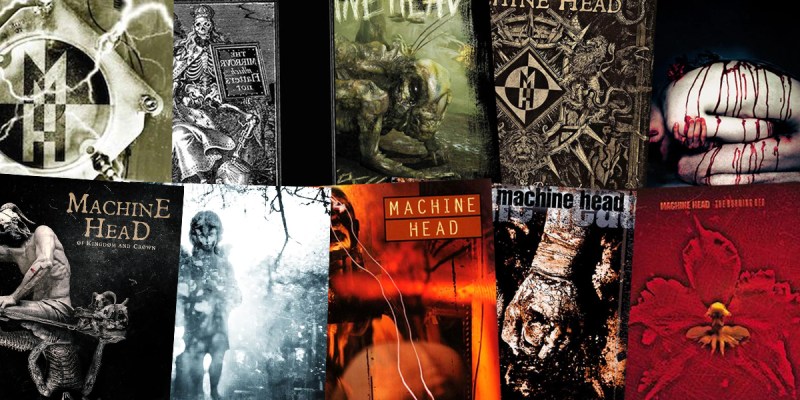Machine Head are an Oakland-based groove metal band formed in 1991 by guitarist and vocalist Robb Flynn at a Metallica show. The band’s lineup has been in flux since its inception, but its best and most well-known lineup is Flynn, lead guitarist Phil Demmel, bassist Adam Duce, and drummer Dave McClain. Besides being the primary creative direction, Flynn is also known for stuffing natural harmonics in his songwriting. As such, Machine Head’s tablature has more diamonds than an African mine. Flynn also likes his online interactions like he likes relationships with former bandmates—bitterly antagonistic. Anyhow, I guess we’re gonna let freedom ring with a shotgun blast by exploring the band’s ten records.
10. Bloodstone & Diamonds (2014)
Like a Tesla in self-driving mode, Machine Head refused to stay in their lane. As such, their unfocused eighth album finds them having an identity crisis. They’re still a groove metal band at their core, which is why the experimentation here—strings, keyboards, some bouncy djent—sounds like two different bands. Worse yet, “Bloodstone & Diamonds” mostly operates in mid-tempo, making its 71 minutes kind of a slog to get through. It’s unfortunate, because there are several terrific melodies here, some nifty riffing, and some of Flynn’s most venomous (read: best) vocals to date. The latter’s fitting, because his political criticism is as biting as ever: “Live to buy, or time to die / It’s all for sale on credit lines / Until the fucking end of time / Shackled to the dotted line.” Ultimately, much of “Bloodstone” is wasted potential, making it the band’s most frustrating full-length.
Play it again: the title track
Skip it: “Sail into the Black”
9. Catharsis (2018)
This isn’t the rap-metal disaster you’ve heard it is. Rather, the majority of “Catharsis” answers the Mad Libs-esque question, “What if Imagine Dragons tried nu metal?” Indeed, this is an overlong pop-metal album in the most literal sense: the emphasis here is on inviting melodies and gigantic choruses, and in that regard it’s a success. The record’s real strength, though, lies in some of Flynn’s best-ever writing. Topical stuff—“Wall Street and the billionaires / Convinced us they’re so smart / Saying, ‘Vote with your wallet / Instead of with your hearts’”—is generally sharp, but it’s the story songs about drug dealing and Louis XI that are truly engaging. This bears the least resemblance to the band, yes, but its focused nature makes for a more coherent and more satisfying work than “Bloodstone.” In reality, “Catharsis” is a good album, but not a good Machine Head album.
Play it again: “Volatile”
Skip it: “Eulogy”
8. Supercharger (2001)
Machine Head’s fourth outing is their other scatterbrained one. On the one hand, “Supercharger” is a fascinating exploration of (presumably) Flynn’s psyche growing up (“When drawing stick-men of pornographic men and women / Thinking all the time there’s something wrong with me”) and the accompanying shitty behavior (“I was that kid prank-calling your girlfriend / Couldn’t get a goddamn date”). On the other, it’s an album of growing pains wherein the band tries to let go of nu metal and return to groove metal, resulting in a quasi-schizophrenia to the proceedings. Yet, it’s a mostly-successful endeavor, thanks to this being their best-played and best-sounding record to this point. Neat riffs and some stellar drumming almost save it. But “Supercharger”’s true notoriety is its lead single, “Crashing Around You,” being released just before 9/11, an event more unfortunately timed than Kublai Khan’s invasion of Japan.
Play it again: “Bulldozer”
Skip it: “Deafening Silence”
7. The Burning Red (1999)
This is the band’s worthwhile nu metal-infused record—yes, that’s a thing if you’re a nostalgic Millennial—and it’s more fun than you remember. That’s despite the awkward sorta-rapping, the brief foray into trip-hop (!?), and the overachieving-high-schooler poetry (“See my fate, underestimate / I intoxicate while you emulate”) likely aimed at the disaffected youth this was made for. Fittingly, Flynn largely sets aside politics and world events, and instead writes like the record’s key demo (“Emptiness fills inside me / Bitterness has denied me / Faith that this world / Could ever really give a shit”). But “The Burning Red” isn’t a downer, because there’s a whole lotta groove, plenty of enjoyable riffing (perhaps thanks to new lead guitarist Ahrue Luster), and even a handful of songs with something approaching a hook. “Burning” may be dated—especially due to the brittle mix—but it’s still better than most metal bands’ late-’90s trend-chasing.
Play it again: “From This Day”
Skip it: the title track
6. ØF KINGDØM AND CRØWN (2022)
Machine Head’s tenth record offers a bit of everything: multi-part prog-groove, soaring and/or dueling leads, hooky melodies, festival-metal choruses, gnarly riffing, balladeering, and thrashy galloping. Guitarist Wacław Kiełtyka (of Decapitated) and session drummer Navene Koperweis breathe new life into the band, making this the most alive MH has sounded in more than a decade—especially the drumming, the most impressive of the band’s career—and it’s a shame this lineup didn’t last. “ØF KINGDØM AND CRØWN” is also notable for being the band’s first concept album. It’s a story-cycle about lost love and killing sprees—i.e., standard fare for Machine Head—but Flynn still finds room for timely political commentary: “Fracking ripping holes in the soil / Fossils of centuries; spill our mother’s sacred oil.” This record is an excellent sample-platter of the band and is, thus, the easiest entrypoint into their catalog.
Play it again: “CHØKE ØN THE ASHES ØF YØUR HATE”
Skip it: “KILL THY ENEMIES”
5. Burn My Eyes (1994)
Machine Head’s debut LP established hallmarks of the quartet’s sound and career, including a penchant for harmonics, trading solos, speeding up for a song’s final section, and snarling socio-political commentary. Of that last one, Flynn basically spends the whole time ranting about corruption everywhere: religion, government, media, the justice system, etc. “Fed up with this whole system / It’s gone on far too long” works as a makeshift thesis, and it’d be subtitled “An open mind with a closed fist.” The lean songwriting and arrangements, meanwhile, allow the riffs room to shine. The only real downside is drummer Chris Kontos: he’s an excellent musician, but he plays like an over-tightened screw, and his stiffness holds the band back. Still, like Pantera’s “Cowboys from Hell,” “Burn My Eyes” is a landmark in groove metal, and one of the most important metal albums of the ’90s.
Play it again: “Davidian”
Skip it: “Real Eyes, Realize, Real Lies”
4. The More Things Change… (1997)
Machine Head’s sophomore effort is an upgraded version of their debut by being thrashier and angrier. The musicianship is improved and more confident—including newcomer McClain on drums, who lends some much-needed looseness—the riffs are sharper, and the arrangements are smarter and more complex. In other words, “The More Things Change…” is what “Burn My Eyes” shoulda been. Flynn, meanwhile, seems to be more frustrated than an incel on Tinder (“My faith has waned / Because I feel the strain / In my eyes it’s all gone wrong”) because of the continually-broken system (“I got a friend might not walk again / And your laws never helped at all / Go fuck your clause, your probable cause / Power-trippin’ above us all”). “Burn” may be the more important record, but this is the superior one, and the band’s best of the decade.
Play it again: “Take My Scars”
Skip it: “Violate”
3. Through the Ashes of Empires (2003)
Luster left in 2002, and then MH lost all traces of nu metal. Helluva coincidence there. “Through the Ashes of Empires,” then, is fantastic thrashy, proggy groove metal—i.e., what they should be doing. Here, Demmel replaces Luster, and Demmel’s presence is felt immediately in flashy leads and tasteful soloing. With inspirational lyrics like “Love will be my rock / The rock that I stand on” and “Let go your sorrow / Sun will shine, this I promise,” “Through” might be MH’s most positive record—though, keep in mind the bar to clear that is sitting in a deep hole. Lest we forget who we’re discussing, much of the album finds Flynn further working through a tortured upbringing that’d make Tomás de Torquemada flinch. Operating at near-peak capacity, they’d take this energy and somehow improve with the follow-up (see #1).
Play it again: “Imperium”
Skip it: “Wipe the Tears”
2. Unto the Locust (2011)
This is essentially a sleeker version of “The Blackening” (see below). At 48 minutes, “Unto the Locust” is their shortest album to date. The record has a stronger melodic focus than its predecessor, with bigger and more memorable choruses, but is no less technical or flashy. Perhaps the band was tired of seeing people grabbing a beer during the ninth and tenth minutes of individual songs on the previous tour. That pairs well with the exhaustion found throughout: “Take the ache beneath my bones / Peel the skin away and leave my body exposed / No grace awaits this broken soul.” That said, there’s some cautious optimism to the proceedings: “So pray to music, build a shrine / Worship in these desperate times.” “Unto” is the band’s last classic, as well as the last with the classic lineup.
Play it again: “Locust”
Skip it: The final minute or so of “Who We Are”
1. The Blackening (2007)
Witness 61 killer minutes of impressive groove metal played with a shit-eating grin, and Machine Head being justified in doing so. All four members peaked at the same time, resulting in this stunner of an album. It’s stuffed full of technical-yet-catchy riffs, dueling leads, and catchy melodies. (The band recorded covers of “Battery” and “Hallowed Be Thy Name,” which is a handy short-hand for the record’s songs.) Lyrically, this is an aggressively-topical record, with the Iraq War being a major throughline: “’Cause blood is their new currency / And oil pumps the heart of money.” There’s also a fucked up love song, anger over an awful take on Dimebag’s murder, and criticism of religion—normalcy, in other words. “The Blackening” remains the band’s finest hour, as well one of the century’s best metal releases.
Play it again: “Wolves”
Skip it: the final 45ish seconds of “Aesthetics of Hate”




